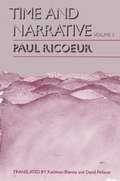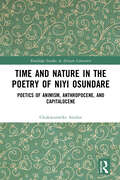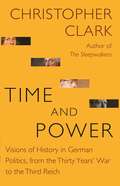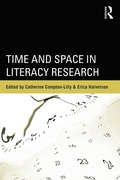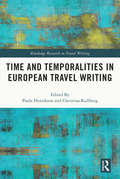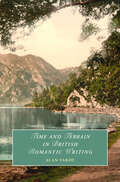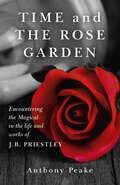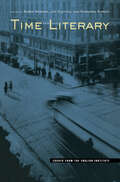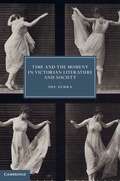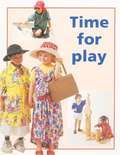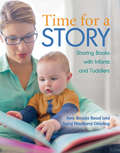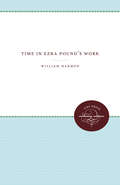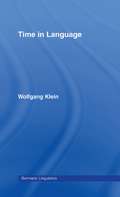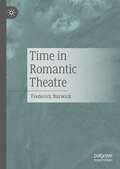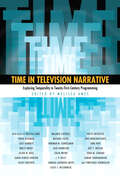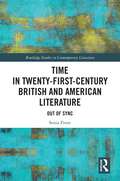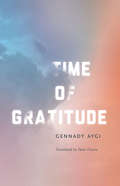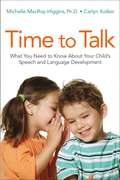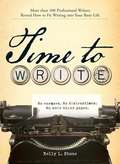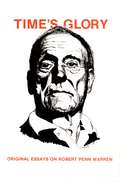- Table View
- List View
Time and Narrative in Ancient Historiography
by Jonas Grethlein Christopher B. KrebsHistorians often refer to past events which took place prior to their narrative's proper past- that is, they refer to a 'plupast'. This past embedded in the past can be evoked by characters as well as by the historian in his own voice. It can bring into play other texts, but can also draw on lieux de mémoire or on material objects. The articles assembled in this volume explore the manifold forms of the plupast in Greek and Roman historians from Herodotus to Appian. The authors demonstrate that the plupast is a powerful tool for the creation of historical meaning. Moreover, the acts of memory embedded in the historical narrative parallel to some degree the historian's activity of recording the past. The plupast thereby allows Greek and Roman historians to reflect on how (not) to write history and gains metahistorical significance. In shedding new light on the temporal complexity and the subtle forms of self-conscious reflection in the works of ancient historians, Time and Narrative in Ancient Historiography significantly enhances our understanding of their narrative art.
Time and Narrative: Volume 3
by Paul Ricoeur David Pellauer translated by Kathleen BlameyIn the first two volumes of this work, Paul Ricoeur examined the relations between time and narrative in historical writing, fiction, and theories of literature. This final volume, a comprehensive reexamination and synthesis of the ideas developed in volumes 1 and 2, stands as Ricoeur's most complete and satisfying presentation of his own philosophy. Ricoeur's aim here is to explicate as fully as possible the hypothesis that has governed his inquiry, namely, that the effort of thinking at work in every narrative configuration is completed in a refiguration of temporal experience. To this end, he sets himself the central task of determing how far a poetics of narrative can be said to resolve the aporias--the doubtful or problematic elements--of time. Chief among these aporias are the conflicts between the phenomenological sense of time (that experienced or lived by the individual) and the cosmological sense (that described by history and physics) on the one hand and the oneness or unitary nature of time on the other. In conclusion, Ricoeur reflects upon the inscrutability of time itself and attempts to discern the limits of his own examination of narrative discourse. As in his previous works, Ricoeur labors as an imcomparable mediator of often estranged philosophical approaches, always in a manner that compromises neither rigor nor creativity. --Mark Kline Taylor, Christian Century In the midst of two opposing contemporary options--either to flee into ever more precious readings . . . or to retreat into ever more safe readings . . . --Ricoeur's work offers an alternative option that is critical, wide-ranging, and conducive to new applications. --Mary Gerhart, Journalof Religion
Time and Nature in the Poetry of Niyi Osundare: Poetics of Animism, Anthropocene, and Capitalocene (Routledge Studies in African Literature)
by Chukwunwike AnolueThis book provides an ecocritical analysis of the poetry of the famous Nigerian poet Niyi Osundare. It interrogates the intricate interface between time and nature in 11 of Osundare’s defining poetry collections. This is a book of postcolonial ecocriticism from an African perspective. It brings together the ecocritical theory of animism and theories of geologic time in the discussion of Osundare’s poetry. Osundare shows that animism has a lot to offer in enriching human understanding of the ecosystem. And while he eloquently catalogues problems undermining the health of the earth in this age of the Anthropocene and the Capitalocene in his poetry, he also holds on to the hope of a better future. The book concludes that Osundare’s optimism is what informs his use of poetry to press humankind to rise to the duty of salvaging the environment. Deploying an interdisciplinary approach that stretches across the fields of literature, religion, geology, physics, economics, and anthropology, this book will be an important read for those looking for fresh ways to understand Osundare’s poetry and African nature writing.
Time and Power: Visions of History in German Politics, from the Thirty Years' War to the Third Reich (The\lawrence Stone Lectures #11)
by Christopher ClarkFrom the author of the national bestseller The Sleepwalkers, a book about how the exercise of power is shaped by different concepts of timeThis groundbreaking book presents new perspectives on how the exercise of power is shaped by different notions of time. Acclaimed historian Christopher Clark draws on four key figures from German history—Friedrich Wilhelm of Brandenburg-Prussia, Frederick the Great, Otto von Bismarck, and Adolf Hitler—to look at history through a temporal lens and ask how historical actors and their regimes embody unique conceptions of time.Inspired by the insights of Reinhart Koselleck and François Hartog, two pioneers of the “temporal turn” in historiography, Clark shows how Friedrich Wilhelm rejected the notion of continuity with the past, believing instead that a sovereign must liberate the state from the entanglements of tradition to choose freely among different possible futures. He demonstrates how Frederick the Great abandoned this paradigm for a neoclassical vision of history in which sovereign and state transcend time altogether, and how Bismarck believed that the statesman’s duty was to preserve the timeless permanence of the state amid the torrent of historical change. Clark describes how Hitler did not seek to revolutionize history like Stalin and Mussolini, but instead sought to evade history altogether, emphasizing timeless racial archetypes and a prophetically foretold future.Elegantly written and boldly innovative, Time and Power takes readers from the Thirty Years’ War to the fall of the Third Reich, revealing the connection between political power and the distinct temporalities of the leaders who wield it.
Time and Space in Literacy Research
by Catherine Compton-Lilly Erica HalversonLiteracy researchers interested in how specific sites of learning situate students and the ways they make sense of their worlds are asking new questions and thinking in new ways about how time and space operate as contextual dimensions in the learning lives of students, teachers, and families. These investigations inform questions related to history, identity, methodology, in-school and out-of school spaces, and local/global literacies. An engaging blend of methodological, theoretical, and empirical work featuring well-known researchers on the topic, this book provides a conceptual framework for extending existing conceptions of context and provides unique and ground-breaking examples of empirical research.
Time and Temporalities in European Travel Writing (Routledge Research in Travel Writing)
by Christina Kullberg Paula HenriksonThis book is a collective effort to investigate and problematise notions of time and temporality in European travel writing from the late medieval period up to the late nineteenth century. It brings together nine researchers in European travel writing and covers a wide range of areas, travel genres, and languages, coherently integrated around the central theme of time and temporalities. Taken together, the contributions consider how temporal aspects evolve and change in regard to spatial, historical, and literary contexts. In a chapter-by-chapter account this volume thus offers various case studies that address the issue of temporality by showing, for example, how time is inscribed in landscape, how travellers’ encounters with other temporalities informed other disciplines; it interrogates the idea of "cultural temporalities" in regard to a tension between past and future, passivity and progression; and focuses on how time is entangled in identity construction proper to travelogues.
Time and Terrain in British Romantic Writing (Cambridge Studies in Romanticism)
by Alan VardyWalking and its relationship to our mental and cultural lives has been a topic of huge academic and popular interest in the last few years. Here, Alan Vardy explores the role of walking in one of its most obvious locations within English literature: Romanticism. Through chapters focusing on both canonical and non-canonical writings – including rich ephemera – by Joseph Cottle, Coleridge, Dorothy and William Wordsworth, de Quincey and John Clare, Time and Terrain in British Romantic Writing draws out a specific focus on affect studies and the relationship between walking and trauma, examining the relationship between emotional states and movement through space and time. It also takes up the work of lesser-known Romantic writers such as Elizabeth Smith and Thomas Wilkinson in order to mount a broad and deep exploration of the quotidian, fleeting events that nonetheless constitute our subjective selves.
Time and The Rose Garden: Encountering The Magical In The Life And Works Of J.B. Priestley
by Anthony PeakeJ.B. Priestley is considered by many to be an old-fashioned playwright whose work is locked in a pre-war world of provincialism and whose ideas are way past their sell-by date. In Time and the Rose Garden, internationally recognised author Anthony Peake re-assesses the plays and novels of this fascinating writer. In doing so, Peake argues that Priestley should be recognised as one of the most prescient of all middle century playwrights and that his ideas on time, consciousness and mortality can be found in hugely popular blockbusters such as The Matrix, Vanilla Sky, Deja Vu, Sliding Doors, Butterfly Effect and many others.
Time and the Literary (Essays from the English Institute)
by Marianne Hirsch Karen Newman Jay ClaytonTime and the literary: the immediacy of information technology has supposedly annihilated both. Email, cell phones, satellite broadcasting seem to have ended the long-standing tradition of encoding our experience of time through writing. Paul de Man's seminal essay "Literary History and Literary Modernity" and newly commissioned essays on everything from the human genome to grammatical tenses argue, however that the literary constantly reconstructs our understanding of time. From eleventh-century France or a science-fiction future, Time and the Literary shows how these two concepts have been and will continue to influence each other.
Time and the Moment in Victorian Literature and Society
by Sue ZemkaSudden changes, opportunities, or revelations have always carried a special significance in Western culture, from the Greek and later the Christian kairos to Evangelical experiences of conversion. This fascinating book explores the ways in which England, under the influence of industrializing forces and increased precision in assessing the passing of time, attached importance to moments, events that compress great significance into small units of time. Sue Zemka questions the importance that modernity invests in momentary events, from religion to aesthetics and philosophy. She argues for a strain in Victorian and early modern novels critical of the values the age invested in moments of time, and suggests that such novels also offer a correction to contemporary culture and criticism, with its emphasis on the momentary event as an agency of change.
Time for Adventure: A Grammar Tales Book to Support Grammar and Language Development in Children (Grammar Tales)
by Jessica HabibJem’s friend, Lottie, has come to play, but Jem is taking all the toys for herself. She learns that adventures are more fun when you share. Targeting Subject-Verb-Object sentences and pronouns, this book provides repeated examples of early developing syntax and morphology which will engage and excite the reader while building pre-literacy skills and make learning fun, as well as exposing children to multiple models of the target grammar form. Perfect for a speech and language therapy session, this book is an ideal starting point for targeting client goals and can also be enjoyed at school or home to reinforce what has been taught in the therapy session.
Time for Play (Rigby PM Plus Blue (Levels 9-11), Fountas & Pinnell Select Collections Grade 3 Level Q #Red (Levels 3-5))
by John PettittNIMAC-sourced textbook
Time for a Story
by Saroj Ghoting Amy ReadIf you’ve ever tried reading with an infant or toddler, it may look something like this: you sit down on the floor and start reading, and the child pats the pages, chews on the book, or toddles away! With all the signs pointing to disinterest, is it even worth it to read to children from infancy to age two? The answer is yes! Children’s books are tools that prepare young children for later reading success—the way you use books with children makes a difference in their early literacy development. Planning story times with infants and toddlers can be challenging, but with thought and preparation, you can maximize the reading experiences of these little learners! In Time for a Story, explore fun and engaging ways to talk, sing, read, write, and play with young children throughout the day to help them begin developing important pre-literacy skills, including phonological awareness, print awareness, letter knowledge, and background knowledge. These practical techniques will help you put the children in your care on the path to school readiness!
Time in Ezra Pound's Work
by William HarmonThroughout nearly sixty-five of writing, Pound specialized on the suffocating effects of time on poetry, aesthetic form, and history. Harmon examines Pound's strategies for dealing with time and arrives at a persuasive reading of Pound's works in general and of the The Cantos in particular. By concentrating on a single theme and technique, the author demonstrates a coherence in the writing that elucidates the corpus for both the specialist and the casual reader.Originally published in 1977.A UNC Press Enduring Edition -- UNC Press Enduring Editions use the latest in digital technology to make available again books from our distinguished backlist that were previously out of print. These editions are published unaltered from the original, and are presented in affordable paperback formats, bringing readers both historical and cultural value.
Time in Language
by Wolfgang KleinThis book looks at the various ways in which time is reflected in natural language. All natural languages have developed a rich repetoire of devices to express time, but linguists have tended to concentrate on tense and aspect, rather than discourse principles. Klein considers the four main ways in which language expresses time - the verbal categories of tense and aspect; inherent lexical features of the verb; and various types of temporal adverbs. Klein looks at the interaction of these four devices and suggests new or partly new treatments of these devices to express temporality.
Time in Romantic Theatre
by Frederick BurwickThe shift in temporal modalities of Romantic Theatre was the consequence of internal as well as external developments: internally, the playwright was liberated from the old imperative of “Unity of Time” and the expectation that the events of the play must not exceed the hours of a single day; externally, the new social and cultural conformance to the time-keeping schedules of labour and business that had become more urgent with the industrial revolution. In reviewing the theatre of the Romantic era, this monograph draws attention to the ways in which theatre reflected the pervasive impact of increased temporal urgency in social and cultural behaviour. The contribution this book makes to the study of drama in the early nineteenth century is a renewed emphasis on time as a prominent element in Romantic dramaturgy, and a reappraisal of the extensive experimentation on how time functioned.
Time in Television Narrative: Exploring Temporality in Twenty-First Century Programming
by Melissa AmesThis collection analyzes twenty-first-century American television programs that employ temporal and narrative experimentation. These shows play with time, slowing it down to unfold narrative through time retardation and compression. They disrupt the chronological flow of time itself, using flashbacks and insisting that viewers be able to situate themselves in both the present and the past narrative threads. Although temporal play has existed on the small screen prior to the new millennium, never before has narrative time been so freely adapted in mainstream television. The essayists offer explanations for not only the frequency of time-play in contemporary programming, but also the implications of its sometimes disorienting presence.Drawing upon the fields of cultural studies, television scholarship, and literary studies, as well as overarching theories concerning postmodernity and narratology, Time in Television Narrative offers some critical suggestions. The increasing number of television programs concerned with time may stem from any and all of the following: recent scientific approaches to quantum physics and temporality; new conceptions of history and post history; or trends in late-capitalistic production and consumption, in the new culture of instantaneity, or in the recent trauma culture amplified after the September 11 attacks. In short, these televisual time experiments may very well be an aesthetic response to the climate from which they derive. These essays analyze both ends of this continuum and also attend to another crucial variable: the television viewer watching this new temporal play.
Time in Twenty-First-Century British and American Literature: Out of Sync (Routledge Studies in Contemporary Literature)
by Sonia FrontThis book investigates representations of time in twenty‑first‑century Anglo‑American literature. In the digital era, characterized by a new regime of time, fiction offers revisions of prevalent, oppressive notions of time that can serve as productive political strategies to reclaim the agency of the subject. This book discusses literary texts that craft innovative temporal structures out of sync with the new time logic: suspended temporality (Chapter 1); time as a conflation of phenomenological experience and cosmological laws (Chapter 2); previewing the future (Chapter 3); and networked memory (Chapter 4). The proposed politically productive temporalities, such as deep presence or resonance, compatibilism, contingency, and the use of narrative as a chronologizing strategy, ground a vision of change and suggest a way out of the crisis of time. Identifying new timeframes in twenty‑first‑century fiction by an array of writers, this book demonstrates that literature remains a valid medium for theorizing and representing time.
Time of Gratitude
by Peter France Gennady AygiA collection of extraordinary essays by one of the seminal Russian poets of the twentieth century Gennady Aygi’s longtime translator and friend Peter France has compiled this moving collection of tributes dedicated to some of the writers and artists who sustained him while living in the Moscow “underground.” Written in a quiet intensely expressive poetic style, Aygi’s inventive essays blend autobiography with literary criticism, social commentary, nature writing, and enlightening homage. He addresses such literary masters as Pasternak, Kafka, Mayakovsky, Celan, and Tomas Tranströmer, along with other writers from the Russian avant-garde and his native Chuvashia. Related poems by Aygi are also threaded between the essays. Reminiscent of Mandelstam’s elliptical travel musings and Kafka’s intensely spiritual jottings in his notebooks, Time of Gratitude glows with the love and humanity of a sacred vocation. “These leaves of paper," Aygi says, 'are swept up by the whirlwind of festivity; everything whirls—from Earth to Heaven—and perhaps the Universe too begins to swirl. Everything flows together in the rainbow colors and lights of the infinite world of Poetry.'
Time to Talk: What You Need to Know About Your Child's Speech and Language Development
by Carlyn Kolker Michelle MacRoy-HigginsWhen it comes to language acquisition, all parents have questions…and?this invaluable resource?has all the answers.When should I expect my baby&’s first word? Is my toddler on his way to talking soon? Is my child speaking as clearly as her peers? All parents end up thinking questions like these during their children&’s formative years, but too few act on them, assuming the answers are too unpredictable to be certain. Time to Talk answers these questions for the curious parent.Written by an experienced speech-language pathologist and mom, this practical and proactive guide will help parents:Understand the building blocks of speech and languageMonitor progress against expected milestonesEnhance their child&’s communication skillsSpot signs of potential problems with hearing, speech, or language developmentAddress common concerns, such as articulation, late talking, stuttering, dyslexia, etc.Foster literacyRaise bilingual children successfullyYour child&’s language acquisition no longer must be a guessing game for you. From baby&’s first babbling to reading readiness, Time to Talk provides everything a parent needs so this vital fundamental skill doesn&’t have to be left to chance.
Time to Tug
by Cindy Peattie Paula LaRosaTitle contained within StartUp Phonic Core Program. Not Sold Separately
Time to Write
by Kelly L Stone"Okay, no more excuses. Light bulbs went off in my head as I read Kelly L. Stone's Time to Write with its shrewd observations and sage, practical advice for making time to write."-HALLIE EPHRON, author of Writing and Selling Your Mystery Novel. "When it's a writing day, I'm writing. Period." - JODI PICOULT. "If the trouble is just getting started in the morning, I often change my writing place or method." -JENNIFER BLAKE. In Time to Write, more than 100 professional writers from across genres-including Sandra Brown, Catherine Coulter, Wendy Corsi Staub, Merline Lovelace, Steve Berry, Tess Gerritsen, Ann Major, Cherry Adair, Christine Feehan, Julia London, and Eloisa James-share their secrets to finding time to write. And if they could find the time to write, then so can you. The time is now.
Time to Write
by Kelly L. Stone"Okay, no more excuses. Light bulbs went off in my head as I read Kelly L. Stone's Time to Write with its shrewd observations and sage, practical advice for making time to write. "-HALLIE EPHRON, author of Writing and Selling Your Mystery Novel. "When it's a writing day, I'm writing. Period. " - JODI PICOULT. "If the trouble is just getting started in the morning, I often change my writing place or method. " -JENNIFER BLAKE. In Time to Write, more than 100 professional writers from across genres-including Sandra Brown, Catherine Coulter, Wendy Corsi Staub, Merline Lovelace, Steve Berry, Tess Gerritsen, Ann Major, Cherry Adair, Christine Feehan, Julia London, and Eloisa James-share their secrets to finding time to write. And if they could find the time to write, then so can you. The time is now.
Time's Glory: Original Essays on Robert Penn Warren
by James A. Grimshaw Jr.Robert Penn Warren, the first U.S. Poet Laureate, has received every honor this country can bestow on a writer. Warren has written fiction, nonfiction, and poetry, and has proven to be one of the most versatile writers in modern times. Now, seven original essays on Warren's writing, written by leading scholars and students, have been brought together in one volume. In Warren's fiction sloth, or acedia, is the deadliest of sins. Frances Bixler examines this theme as it courses through five novels. World Enough and Time and The Cave both are analyzed in chapters of their own. Warren's volume of poetry Altitudes and Extensions is given a close reading, while his nonfiction works, particularly The Legacy of the Civil War and Jefferson Davis Gets His Citizenship Back, are also critiqued. The breadth and depth of Robert Penn Warren's canon of work are illustrated by the essays collected by James A. Grimshaw, Jr. Although many books have been written on Warren and his work, to cover such a wide range of his work in one volume is a rare achievement. James A. Grimshaw, Jr., is a professor in, and head of, the Department of Literature and Languages at East Texas State University. His publications include Robert Penn Warren: A Descriptive Bibliography and Robert Penn Warren's "Brother to Dragons": A Discussion .

